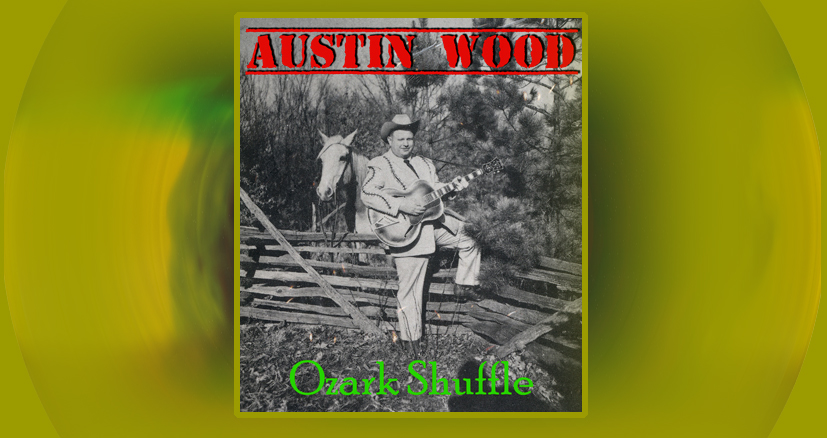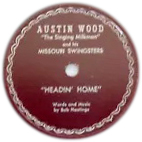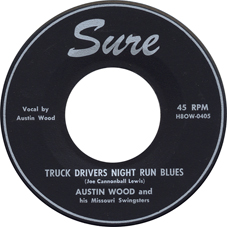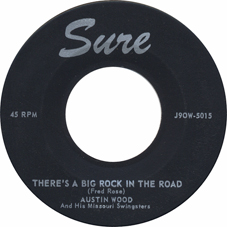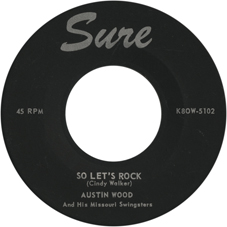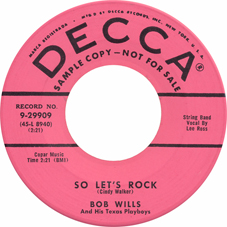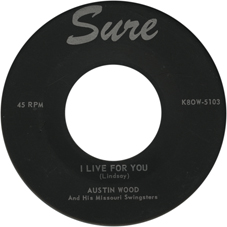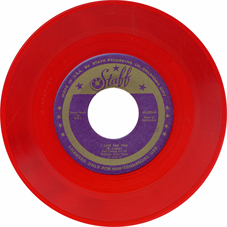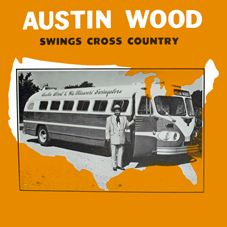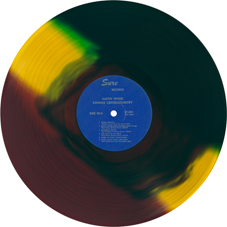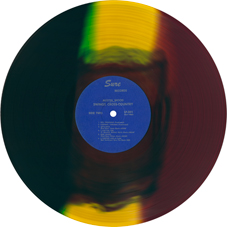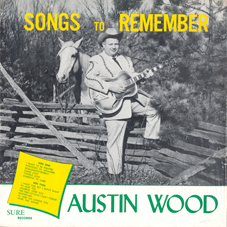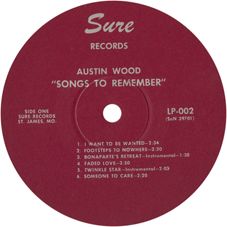THE AUSTIN WOOD STORY
Like most other states in the good ol' USA, Missouri was the cradle of much great music. The St Louis area in particular had a vibrant and diverse musical scene in the 40's and 50's. Jazz, blues, hillbilly and later on, rock'n'roll were well represented there. Chuck Berry is one of the best-known figures from that place of course, but there were as always a host of other artists who brought good stuff to the table. They often recorded - or began recording - for tiny independent labels : K-Ark, Bobbin, Joplin, Westport, Sho-Me, R, Big K, Stardust, Crestwood... Another such imprint was Sure, although there were other labels with the same name across the nation. This particular one belonged to Austin Wood, a true hillbilly singer very much influenced by western swing who greatly contributed to keep the Bob Wills sound alive in the sixties.Not much literature exists about him and we have to be grateful one more time to British researcher, Phillip J. Tricker, for the piece he wrote in 'Roll Street Journal' #13 which, together with the liner notes of his two albums, will provide the bulk of the biographical info so far available.
The man who went on to be known as 'The Singing Milkman' was born and raised on his father's dairy farm in St James, Missouri. Phil Tricker says that his birth date remains unclear - either 1916 or 1920. Life was particularly hard on him as he lost an eye at the age of seven in a lawn mower accident. He had already become passionately interested in music, and that's probably what helped him find a meaning to life. Luther W. Martin, who wrote the liner notes to his first LP and was general manager at KTRR, a radio station in Rolla where Austin was to work most of his life from 1948 on, recounts that 'he purchased his first guitar the hard way...by hulling thousands of walnuts and catching dozens of rabbits to raise the needed $7.50. Austin was only nine years old at the time.' Grant Turner, the famous DJ at WSM in Nashville who was friendly with Austin and contributed the notes to his second LP, adds that Austin used to carry his guitar in a flour sack when he went to take lessons on it ! He then began to sing and play guitar every time an opportunity presented itself - Ozark pie suppers, picnics and the like.
But Austin was determined to hit the big time and radio was the next logical aim in the forties. After doing a broadcast over KFRU in Columbia, Missouri, in 1940, he was spotted by a certain Pappy Cheshire who recruited him in his 28-member 'Big Old Fashioned Barn Dance' group whose show was aired on KMOX in St Louis. Phil wrote that Austin stayed with this outfit until 1943 when he decided to form his own band, The Missouri Swingsters. But things might not be so simple. Luther W. Martin states that Austin pressed his first record in 1941 and I'm pretty convinced that this record is the one that's pictured at top left, most probably a custom pressed '78. If such is the case, and since the name 'Missouri Swingsters' appears on the label, that would mean that the aforementioned date of 1943 is incorrect. The songwriters for this disc were part of The Missouri Swingsters : Bob Hastings for 'Headin' Home' and Ward Wood (spelled 'Woods' here) for the other side, a fast western swinger with extended fiddle, guitar and piano breaks. Bob was the lead guitar player while Ward was the bass fiddle player. Other members of the band included Smokey Burd on steel guitar and Tommy Watson on fiddle. Whatever the recording date, there must have been a sizeable hiatus between this first disc and the following which appeared on his own Sure label founded, again according to Phil Tricker, approximately in 1948. However, there's also a record on the obscure Town & Country label which might have been released in between, containing Austin's version of 'Sweet Temptation', a song written and first recorded by Merle Travis in 1947. Thus, the Sure label might not have really started until the early 50's. It is possibly during this time that Austin, in another terribly sad twist of fate, lost his other eye because of a milk can which fell brutally on his head. Remarkably, Austin's blindness is never mentioned in the notes to his albums.
Check out the discography below and you'll notice that the numbering system of the Sure label is also very peculiar. The first two discs bore the same number, 10883, with no precise matrix numbers assigned to the songs. Those first four songs were most certainly recorded at the same session, another clue being the presence of a second singer, Dottie Minor. Described by Phil Tricker as a very versatile musician as well, Dottie, whose real name was Dorothy Elena Phillips, had run an all girl band at WLS, Chicago, during the Second World War before working clubs in the Los Angeles area for a while. There's a record on the Tex label (#104) that's credited to a Dorothy Minor who's probably the same gal. She sings on Roy Acuff's 'Night Train To Memphis' and Floyd Tillman's 'Cold, Cold War With You' while Austin handles the vocal on 'Tellin' My Troubles To My Old Guitar' (written by Kentucky singing cowboy star, Don Weston) and 'Teardrops On My Old Guitar', two songs evidently very meaningful to him.
'Everybody's Sweetheart To You' was next (Sure 11799), a delightful uptempo hillbilly swinger with steel and fiddle breaks, a strong bass backing and a feast of clean but sharp guitar picking. It was a regional hit. At last, the matrix number informs us that it was released in 1956 and that the record is an RCA custom press, like all those that will follow until into the 60's. Most of the time, those records didn't have a specific catalog number ; they only showed the master numbers both on the label and stamped in the dead wax. There were two singles issued in 1957 ; one of them featured a good version of Joe 'Cannonball' Lewis's 'Truck Driver's Night Run Blues', the other included his first attempt at the much loved Bob Wills classic, 'Faded Love'. In fact, most of his records would then feature at least a song recorded by Wills at some point. While his first outing for 1958 featured two instrumentals showcasing Kenny Baker's fiddling, the second coupled an excellent bopper, 'When My Baby Comes Home', co-written by Austin Wood, with a lively version of Fred Rose's 'There's A Big Rock In The Road' that Wills had once waxed for Columbia.
1959 started with a Gospel offering, both songs being sung over an organ backing. But indisputably, at least for us, European collectors, the 'pièce de résistance' in Austin Wood's discography remains his second release from the same year, a cracking double sider coupling 'So Let's Rock' with 'I Live For You'. Just about all country artists of the fifties tried their hand at rock'n'roll when it exploded on the scene in 1956. Some of the best loved rockabilly platters belong to country legends like Skeets McDonald, George Jones, Buck Owens, Roy Hall, Cowboy Copas and Bill Mack, to name a few. Even Bob Wills had succumbed to the temptation when he cut 'So Let's Rock', a Cindy Walker composition, for Decca in 1956 with a vocal by Lee Ross. Frankly, it wasn't a successful attempt at all, simply an oddity in his repertoire, but it had perhaps stuck in Austin's mind who decided to cover it three years later...and turned it into an absolute rockin' masterpiece. Now, it could indeed have been recorded earlier as the master numbers only refer to the year of release.
No fiddle or steel this time, but a piano makes an appearance in the background ; it is clearly audible in the intro, where it punctuates the staccato guitar part. Austin then attacks the song with an assured vocal over a jumping beat, sometimes joined by the band at the end of the verses à la Bill Haley & the Comets. Like in all those great rockin' records, the crucial bit is the instrumental break and there's no disappointment here : the guitar solo is both superbly constructed and oh, so powerful - one of my personal faves ! Amazingly, the flip side is yet another song associated with Bob Wills who had cut it for MGM. 'I Live For You', a beautiful hillbilly ballad, was written and first recorded by Merl Lindsay & His Oklahoma Night Riders for the rare Staff label. Merl Lindsay is one of the western swing bandleaders that I rate very highly. He consistently cut top quality records for a variety of labels like 4-Star, Cormac, Bullet, D or MGM, culminating with an astonishing double-sided gem on Mercury coupling 'Cotton Pickin' Boogie' with 'Singing Water Baby Blues' (#70117). Austin's take on 'I Live For You' is excellent, with the return of the steel guitar and another splendid lead guitar solo.
Thus, Austin Wood's last platter during the fifties was a triumph of good taste and musicality.
Let's go back to Luther W. Martin's notes for a moment. He writes : 'For 17 years, since 1948, the name and voice has become a household fixture in thousands of homes in the Missouri Ozarks by way of KTTR, Rolla. [] In addition, he has broadcast several program series over KOMU-TV, Columbia, and KRCG-TV, Jefferson City. One of the high spots in his life has been Austin's appearance as 'Mr DJ USA' over WSM, Nashville. [] In addition, he has appeared a number of times on WSM's 'Grand Ole Opry' and dozens of times on Ernest Tubb's Show from the record shop. The latest achievement on Austin's list is the opening of a 1,200 seat country music theatre, 'Austin's Nashville Opry', on US Highway 54, two miles south of Bagnell Dam'. In his notes to Austin's second album, Grant Turner adds : 'Austin's Nashville Opry has become quite an institution. From May through Labor Day, you'll usually find one or more stars of the Grand Ole Opry appearing as guest star, and Austin runs shows on the week-end up into the late fall, in addition to almost daily shows during the summer'.
Turner points out that he appeared on the show for three days during the summer of '66, and confirms that Ernest Tubb once told him that 'he and his Texas Troubadours had been there every year since the theatre was opened'.
Wood's next record would hit the local racks in 1961 and again, it sounds like it had been recorded earlier. Fiddle and steel guitar are the stars of the show on both the vocal side ('Dont Bring Your Broken Heart To Me') and the instrumental flip (yes, a faithful version of Bob Wills' evergreen 'A Maiden's Prayer'). These two songs, as well as ten others mostly culled from his previous Sure singles from the 50's, were compiled onto his first long player ('Austin Wood Swings Cross Country') which, by deduction from Luther W. Martin's notes above, would have been pressed in 1965. The songs that didn't originally appear on 45's are the vocal 'Deep Water' and the three instrumentals, 'Bill Cheatham', 'Corrine, Corrina' and 'Ozark Shuffle' - all excellent. 'Deep Water' comes from Bob Wills's catalog and went on to be much recorded (Charlie Carroll, Ray Price, George Strait...) ; it sounds like it was recorded at the same time as 'So Let's Rock' as it features some very audible piano but there's also the addition of a tenor saxophone. 'Bill Cheatham' is a fiddle showcase while 'Corrine, Corinna' gets a furious fiddle and steel guitar treatment, the steel playing being particularly noteworthy. The fiddle-driven 'Ozark Shuffle' is notable for its slappin' bass and another superb rockabilly-style guitar solo. Were all those sides recorded at a radio station studio or in a proper recording studio ?
Like on some of the singles, there are no writer credits for the songs and some are even mistitled ('So Let's Rock' becomes 'Let's Rock' for instance). The Sure label color was black for the singles except for the last one (45-101) which was maroon. For the albums, the color was blue for this LP, and maroon for the next. I'll let you admire the multicolor vinyl press of my copy on the right column ! As far as I know, they were mono only. The Sure label was by then distributed by Sound Of Nashville.
Probably around the time of his untimely death, from a heart attack in the summer of 1967, a second album was released, titled 'Songs To Remember' and comprised of his more recent stuff (up to his very last single, 'Footsteps To Nowhere', although strangely enough, the penultimate, 'I Hit The Jackpot', was not included), recorded in the early to mid-60's. Avoiding the trappings of so many country productions of the era, it's an enjoyable record even if Austin's voice sounds a bit tired at times. The Bob Wills connection is still well represented by 'The Kind Of Love I Can't Forget', 'I Want To Be Wanted', 'Twinkle Star' and a new version of 'Faded Love'. Wills had cut the three last songs while under contract with MGM, a phase of his career which definitely influenced a lot of other artists. When I stayed with Hank Penny in 1987, I had brought him a copy of the Bear Family box set, 'Papa's Jumpin', which contained all of Bob's recordings for the label from 1947 to 1954 ; Hank was overjoyed and confided to me that they were his favorites. All the songs on Austin's album retain that western swing flavor with the fiddles and steel guitar well to the fore. Not sure whether or not Austin is present on the four instrumental tracks ; one of them, the oft-recorded 'Bonaparte's Retreat', features a nice echo guitar part. Like with the first LP, there's a total lack of info about the players in the liner notes but it could well be Buddy Emmons or Maurice Anderson on pedal steel. Noted western swing researcher Buddy McPeters from Hemet, California, is adamant that it's Johnny Gimble who plays that 5-string fiddle on 'I'll Keep On Loving You' with maybe Reece Anderson on steel. He explains : 'The reason I was thinking that it was Anderson is that Gimble had not moved to Nashville when that album was recorded (he migrated there in '68-'69), and he and Maurice had a band around Waco they played in together with Curley Hollingsworth on piano (also sounds like his style here) when Johnny was still cutting hair at the VA Hospital there to pay the bills and playing out on weekends with Reece & Curley & a bass and drummer'. Given Austin's connection with Ernest Tubb, one could also suggest that some of the Texas Troubadours might have been involved.
Most everything that Austin Wood cut was resurrected on CD by two custom British labels, THR and BACM. I doubt that the original Sure tapes and acetates have been used. If they still exist, and if some of his radio and TV shows have been preserved somewhere, the whole would help to make a perfect package.
Even if Austin cut a fabulous rock'n'roll single in 'So Let's Rock', we must bear in mind that he was, like all his peers, a country singer at heart. In retrospect, looking at his fairly sizeable discography and his numerous achievements, and considering the terribly hard times in his life, Austin Wood can be rightly remembered as a very talented and courageous man who did more for real country music than can be imagined at first glance.
Like on all pages, all record scans are taken from the Big V Jamboree's collection.
AUSTIN WOOD - THE DISCOGRAPHY
| AUSTIN WOOD & HIS MISSOURI SWINGSTERS | ||
| No label name | Headin' Home (Bob Hastings) You Can Play Your Little Game Around The Corner (Ward Woods) |
DISCO-A DISCO-B |
| Sure 10883-A Sure 10883-B |
Night Train To Memphis (Smith-Hughes-Bradley) Tellin' My Troubles To My Old Guitar (Don Weston) |
|
| Sure 10883-C Sure 10883-D |
Cold, Cold War With You (Floyd Tillman) Teardrops On My Old Guitar (Austin Wood-Ward Wood) |
|
| Sure 11799-A Sure 11799-B |
Everybody's Sweetheart To You It's My Heart That knows |
G8OW-1039 G8OW-1038 |
| Sure 11800-A Sure 11800-B |
Baby, How Come ? (O. Carnahan-Austin Wood) I Will Still Remember While You Try To Forget (S. Manes) |
G8OW-5934 G8OW-7059 |
| Sure | Truck Driver's Night Run Blues (Joe Cannonball Lewis) What They're Saying In The Old Home Town (Rosetta Elmore) |
H8OW-0405 H8OW-0404 |
| Sure | Give Me Just A Little Time (Ioan Pool) Faded Love (B. Wills-J. Wills) |
H8OW-8356 H8OW-8357 |
| Sure | Gray Eagle (Arranged and Fiddled by Kenny Baker) Farewell Blues (Arranged and Fiddled by Kenny Baker) |
J8OW-0398 J8OW-0399 |
| Sure | There's A Big Rock In The Road (Fred Rose) When My Baby Comes Home (Ward Wood-Austin Wood) |
J9OW-5015 J9OW-5016 |
| Sure | I Just Kneel Down & Pray (Earl Anderson) A Purpose And A Plan (Earl Anderson) |
K8OW-1760 K8OW-1761 |
| Sure | So Let's Rock (Cindy Walker) I Live For You (Merl Lindsay) |
K8OW-5102 K8OW-5103 |
| Sure | Don't Bring Your Broken Heart To Me Maiden's Prayer (Bob Wills) |
M8OW-2601 M8OW-2602 |
| Sure 932W-5256 | I Hit The Jackpot (When I Won You) (Wellington-Massey) Draggin' The Bow (Wellington-Massey) |
P4KM-5256 P4KM-5257 |
| Sure 45-101 | I Want To Be Wanted Footsteps To Nowhere |
SoN 39691 SoN 39692 |
| Town & Country 521 | Somebody Else's Troubles Sweet Temptation |
|
| ALBUMS | ||
| Sure LP-001 | AUSTIN WOOD - SWINGS CROSS COUNTRY Ozark Shuffle (inst)-Don't Bring Your Broken Heart To Me-Maiden's Prayer (inst)-Big Rock In The Road-When My Baby Comes Home-Kneel Right Down And Pray-Bill Cheatham (inst)-Corrina, Corrina (inst)-Let's Rock- I Live For You-Deep Water-A Purpose And A Plan |
SoN 13861/2 |
| Sure LP-002 | AUSTIN WOOD - SONGS TO REMEMBER I Want To Be Wanted-Footsteps To Nowhere-Bonaparte's Retreat (inst)-Faded Love (2nd version)-Twinkle Star (inst)-Someone To Care-I Want You But I Don't Want To Hurt You-Worried Over You-The Kind Of Love I Can't Forget-Snowflake (inst)-I'll Keep On Loving You-Over The Waves (inst) |
SoN 39701/2 |

